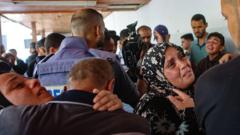Following a recent Israeli airstrike that severely damaged al-Ahli hospital in Gaza, the World Health Organization reports critical shortages of medical supplies and frequent attacks on healthcare facilities, raising alarm over the humanitarian crisis in the region.
Escalating Crisis: Gaza Hospitals Facing Dire Conditions Amid Israeli Strikes

Escalating Crisis: Gaza Hospitals Facing Dire Conditions Amid Israeli Strikes
The World Health Organization reports catastrophic health conditions in Gaza as Israeli airstrikes worsen the situation at al-Ahli hospital, prompting calls for international intervention.
The World Health Organization (WHO) has expressed grave concern over the deteriorating conditions at hospitals in Gaza, labelling the situation as "beyond description." This statement follows a devastating Israeli airstrike on the al-Ahli hospital, a major healthcare facility in Gaza City, which reportedly destroyed its laboratory and caused extensive damage to its emergency room.
Dr. Margaret Harris, a WHO spokesperson, highlighted the ongoing attacks on hospitals and healthcare personnel, asserting that the blockade imposed by Israel has critically depleted medical supplies in the territory. The al-Ahli hospital staff reported that overnight strikes resulted in the destruction of essential medical infrastructure but fortunately did not cause direct casualties among patients; however, they noted the death of a child related to disrupted medical care during the evacuation process prompted by the airstrike.
The Israeli military defended its actions, claiming that the facility housed a "command-and-control center" for Hamas operations, asserting that the attack was a targeted strike to minimize collateral damage. In a response to this incident, the Church of England, which administers the hospital, expressed its "grief, sorrow, and outrage," demanding Israel produce concrete evidence to back its assertions.
This strike at al-Ahli was reportedly the fifth attack on the facility since hostilities escalated. According to the Anglican Diocese of Jerusalem, significant damage was inflicted not only on hospital infrastructure but also on adjacent buildings, including St Philip's Church. The Israeli military stated that a 20-minute warning was given to hospital staff and patients prior to the attack, suggesting efforts were made to mitigate harm.
Dr. Tedros Adhanom Ghebreyesus, WHO Director-General, reiterated that hospitals are protected under international humanitarian law and that such attacks should cease immediately. He noted that the al-Ahli hospital had to relocate 50 patients, with 40 requiring urgent care unable to be transferred due to the circumstances.
Hamas has condemned the attack as a "savage crime," denying allegations of military activity taking place at the hospital. Meanwhile, the Church of England's House of Bishops has deemed the situation in Gaza as intolerable, calling for an independent investigation into the airstrike and emphasizing the violation of fundamental human rights.
Compounding the crisis, WHO representatives reported that al-Ahli's ability to accept new patients has been compromised while repairs are underway, severely affecting trauma care. The facility, once equipped with the only operational CT scanner in northern Gaza, can no longer offer necessary services, impacting critical patient outcomes as other medical supplies remain severely restricted due to ongoing blockades.
Adrian Zimmermann, head of the International Committee of the Red Cross (ICRC) in Gaza, emphasized the dire consequences of the medical supply shortage, warning that the well-being of Gazans needing healthcare services hangs in the balance. WHO officials recounted how they had stockpiled some supplies, but the inability to facilitate their transfer between regions exacerbates the healthcare crisis.
The ongoing military campaign initiated by Israel in response to a deadly cross-border attack on October 7 has seen significant casualties, with over 50,980 people reported killed in Gaza, according to local health officials. The recent ceasefire, which temporarily allowed for some humanitarian aid, ended abruptly as hostilities resumed, further complicating negotiations for future agreements on hostages still being held by Hamas and humanitarian access.
Discussions aimed at establishing a new ceasefire continue to stall amid contrasting demands from both factions, with Hamas accusing Israel of reneging on previously agreed terms. Public pressure remains as families of hostages voice their concerns, uncertain over the government's approach to resolving the crisis while hostilities persist.





















